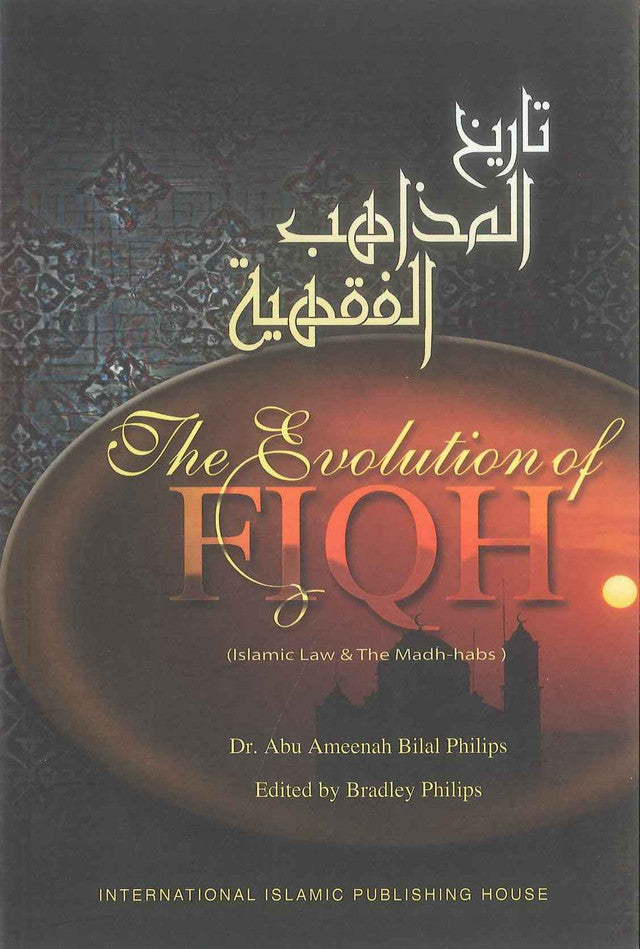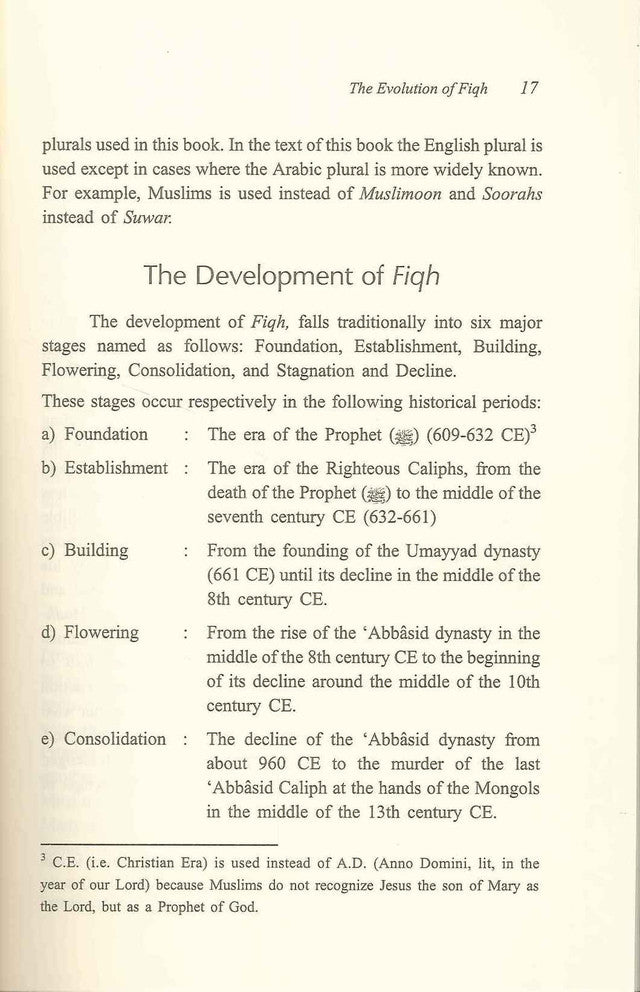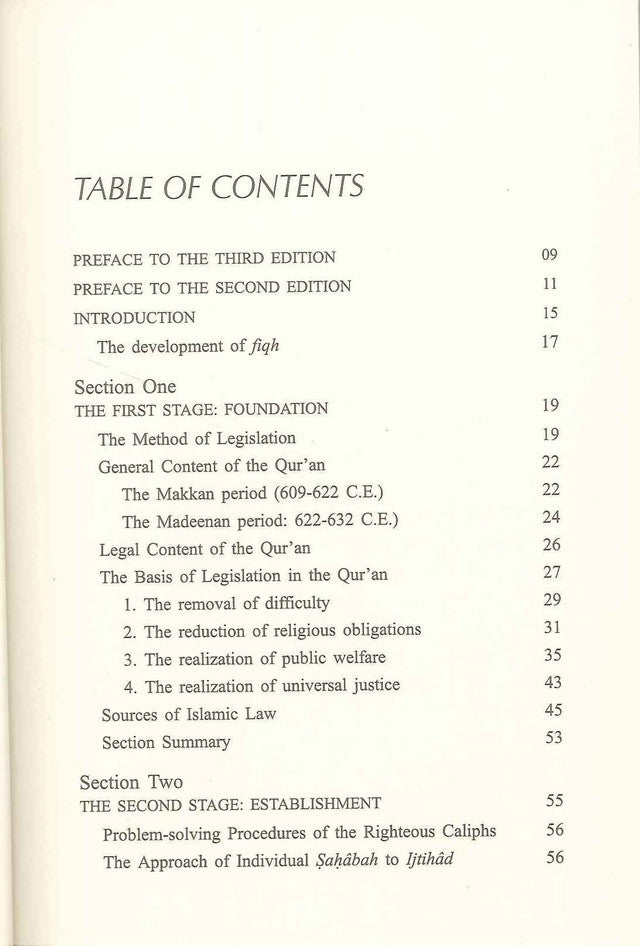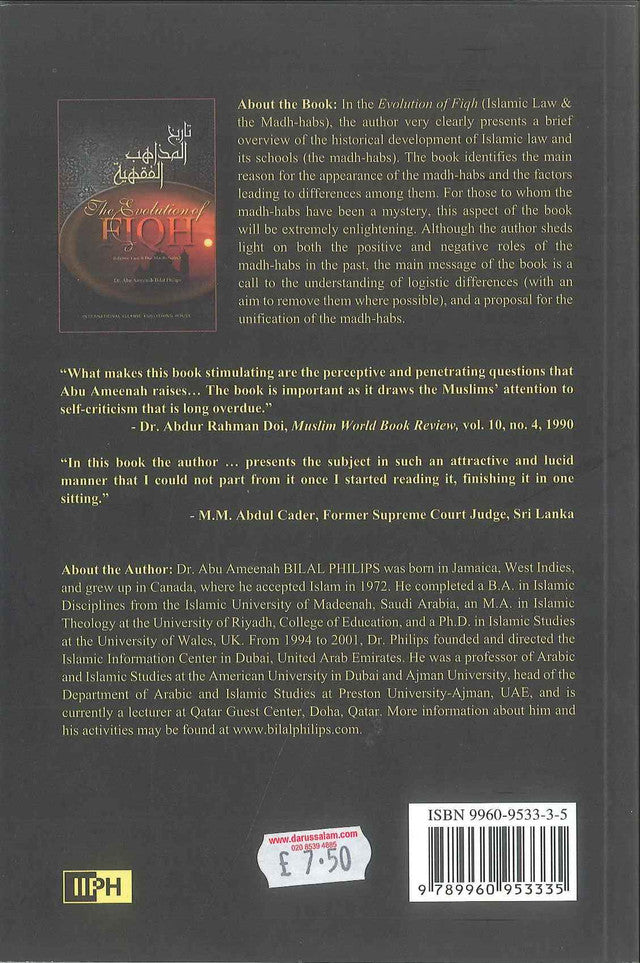The Evolution Of Fiqh : Soft Cover
The Evolution Of Fiqh : Soft Cover
Publisher:
IIPH (International Islamic Publishing House)
Language:
English
Binding:
Soft Cover
Pages: 208
Size: 11X21cm
Couldn't load pickup availability




Collapsible content
Description of Book
The Evolution Of Fiqh : Soft Cover
"The Evolution of Fiqh: Islamic Law & the Madh-habs" by Dr. Abu Ameenah Bilal Philips is a concise yet comprehensive study of the historical development of Islamic jurisprudence. Tracing the origins and evolution of fiqh (Islamic law) from the time of Prophet Muhammad ﷺ through the establishment and institutionalization of the major Sunni schools of thought (madh-habs), the book offers valuable insights into how and why these diverse juristic traditions emerged.
Dr. Bilal Philips delves into the key factors that led to the formation of the madh-habs, such as geographical spread, political influences, varying methodologies of interpretation, and differing access to authentic sources. He sheds light on the reasons for juristic disagreements, helping readers appreciate the depth and legitimacy of differing scholarly opinions within Islam.
Aimed at both students of Islamic studies and general readers, this work seeks to demystify the madh-habs and bridge the gaps between them. With clarity and scholarly balance, Dr. Philips advocates for a spirit of mutual respect among the schools, a deeper understanding of their historical contexts, and a practical proposal toward the unification of Islamic legal thought based on the Qur’an and Sunnah.
Publisher
IIPH (International Islamic Publishing House)
Author
Sample Pages - Content
PAGE NO :1
تاريخ المذاهب الفقهية
The Evolution of
RICH
(Islamic Law & The Madh-habs)
Dr. Abu Ameenah Bilal Philips
Edited by Bradley Philips
INTERNATIONAL ISLAMIC PUBLISHING HOUSE
PAGE NO :2
TABLE OF CONTENTS
PREFACE TO THE THIRD EDITION PREFACE TO THE SECOND EDITION INTRODUCTION
The development of figh
Section One
THE FIRST STAGE: FOUNDATION
The Method of Legislation
General Content of the Qur'an
The Makkan period (609-622 C.E.)
The Madeenan period: 622-632 C.E.) Legal Content of the Qur'an
The Basis of Legislation in the Qur'an
1. The removal of difficulty
2. The reduction of religious obligations
3. The realization of public welfare
4. The realization of universal justice
Sources of Islamic Law
Section Summary
Section Two
THE SECOND STAGE: ESTABLISHMENT
Problem-solving Procedures of the Righteous Caliphs
The Approach of Individual Şahâbah to Ijtihâd
PAGE NO :3
The Evolution of Figr
plurals used in this book. In the text of this book the English plural is used except in cases where the Arabic plural is more widely known. For example, Muslims is used instead of Muslimoon and Soorahs instead of Suwar.
The Development of Figh
The development of Fiqh, falls traditionally into six major stages named as follows: Foundation, Establishment, Building, Flowering, Consolidation, and Stagnation and Decline.
These stages occur respectively in the following historical periods: a) Foundation : The era of the Prophet (5) (609-632 CE)3
b) Establishment:
c) Building
d) Flowering
The era of the Righteous Caliphs, from the death of the Prophet () to the middle of the seventh century CE (632-661)
: From the founding of the Umayyad dynasty (661 CE) until its decline in the middle of the 8th century CE.
: From the rise of the 'Abbasid dynasty in the middle of the 8th century CE to the beginning of its decline around the middle of the 10th century CE.
e) Consolidation: The decline of the 'Abbasid dynasty from about 960 CE to the murder of the last 'Abbasid Caliph at the hands of the Mongols in the middle of the 13th century CE.
3 C.E. (i.e. Christian Era) is used instead of A.D. (Anno Domini, lit, in the year of our Lord) because Muslims do not recognize Jesus the son of Mary as the Lord, but as a Prophet of God.
PAGE NO :4
تاریخ المذاهب . الفقهية
The Evolution of RICH
About the Book: In the Evolution of Figh (Islamic Law & the Madh-habs), the author very clearly presents a brief overview of the historical development of Islamic law and its schools (the madh-habs). The book identifies the main reason for the appearance of the madh-habs and the factors leading to differences among them. For those to whom the madh-habs have been a mystery, this aspect of the book will be extremely enlightening. Although the author sheds light on both the positive and negative roles of the madh-habs in the past, the main message of the book is a call to the understanding of logistic differences (with and aim to remove them where possible), and a proposal for the unification of the madh-habs.
"What makes this book stimulating are the perceptive and penetrating questions that Abu Ameenah raises... The book is important as it draws the Muslims' attention to self-criticism that is long overdue."
- Dr. Abdur Rahman Doi, Muslim World Book Review, vol. 10, no. 4, 1990)
"In this book the author... presents the subject in such an attractive and lucid manner that I could not part from it once I started reading it, finishing it in one sitting."
- M.M. Abdul Cader, Former Supreme Court Judge, Sri Lanka
About the Author: Dr. Abu Ameenah BILAL PHILIPS was born in Jamaica, West Indies, and grew up in Canada, where he accepted Islam in 1972. He completed a B.A. in Islamic. Disciplines from the Islamic University of Madeenah, Saudi Arabia, an M.A. in Islamic Theology at the University of Riyadh, College of Education, and a Ph.D. in Islamic Studies at the University of Wales, UK. From 1994 to 2001, Dr. Philips founded and directed the Islamic Information Center in Dubai, United Arab Emirates. He was a professor of Arabic and Islamic Studies at the American University in Dubai and Ajman University, head of the Department of Arabic and Islamic Studies at Preston University-Ajman, UAE, and is currently a lecturer at Qatar Guest Center, Doha, Qatar. More information about him and his activities may be found at www.bilalphilips.com.
IIPH
Who is Dr. Abu Ameenah Bilal Philips?
Dr. Abu Ameenah Bilal Philips is a renowned Islamic scholar, author, and educator known for his efforts to make Islamic knowledge accessible to a global audience. A convert to Islam, he has authored numerous books on Islamic theology, jurisprudence, and personal development. He founded the Islamic Online University (IOU), offering free and affordable Islamic education worldwide. Dr. Bilal Philips is respected for his clear and straightforward approach to explaining Islamic principles and for promoting a balanced understanding of Islam based on the Quran and Sunnah.




